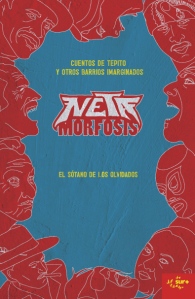Art School (Propositions for the 21st Century), ed. Steven Henry Madoff (The MIT Press) $29.95
 Art School is a serious study of the institutions that facilitate arts education, but more importantly a critique of the prestige those institutions grant within the art community. The anthology considers the contemporary state of arts education not as the culminating final act of history but as a single stage in a larger, more dynamic story. It refuses to stop at criticism, but proceeds with alternatives, never offering a definitive prescription for arts education but detailing attempts at other methods. The volume is well-edited, arranged in a thoughtful sequence of essays, interviews, and case studies, with plentiful photos, not unlike the diversity of a magazine but with real critical heft. My favorite chapters include 13, a conversation between Marina Abramović and Tania Bruguera about the realities of teaching performance art—which they agree less suiting a name than “behavior art”—in Europe and the United States, and 15, “In Latin America: Arts Education Between Colonialism and Revolution,” a more traditional academic essay. The longer chapters are interspersed with short case studies, like number six, “Marfa Complex, 1973 on, Donald Judd, Marfa, Texas,” which immediately follows the latter chapter above, and offers a thumbnail history of that colony and exhibition space for Judd and his fellow Minimalists.
Art School is a serious study of the institutions that facilitate arts education, but more importantly a critique of the prestige those institutions grant within the art community. The anthology considers the contemporary state of arts education not as the culminating final act of history but as a single stage in a larger, more dynamic story. It refuses to stop at criticism, but proceeds with alternatives, never offering a definitive prescription for arts education but detailing attempts at other methods. The volume is well-edited, arranged in a thoughtful sequence of essays, interviews, and case studies, with plentiful photos, not unlike the diversity of a magazine but with real critical heft. My favorite chapters include 13, a conversation between Marina Abramović and Tania Bruguera about the realities of teaching performance art—which they agree less suiting a name than “behavior art”—in Europe and the United States, and 15, “In Latin America: Arts Education Between Colonialism and Revolution,” a more traditional academic essay. The longer chapters are interspersed with short case studies, like number six, “Marfa Complex, 1973 on, Donald Judd, Marfa, Texas,” which immediately follows the latter chapter above, and offers a thumbnail history of that colony and exhibition space for Judd and his fellow Minimalists.
Besides being impressed with Art School, I’m immediately jealous. I wish the contemporary Creative Writing culture would encourage consistent debate and discussion across groups for and against, rather than the occasional Donald Hall-style critique and the incessant growth of the great self-perpetuating, MFA-granting machine.
Institutional Critique: An Anthology of Artists’ Writings, ed. Alexander Alberro & Blake Stimson (The MIT Press) $39.95
Another stellar volume in what might be the best line-up of any American press currently publishing critical titles on art, Institutional Critique collects short essays by artists about the institutions that house and present their works—from Daniel Buren, Olivier Mosset, Michel Parmentier, and Niele Toroni writing in 1968 to Greg Bordowitz in 2004. Like its MIT counterpart above, it also contains interviews (Michael Asher and Stephan Pascher, for example) and is characterized by its variety, its consistent critical quality, and its refusal to diagnose without prescription.
Netamorfosis: Cuentos de Tepito y Otros Barrios Imarginados, El Sótano de los Olvidados (Editorial Sur +, Avra Ediciones) n/a
 In their first Spanish-only title, Editorial Sur+, one of the most cosmopolitan and interesting young publishing houses in Mexico, anthologizes short fiction by members of the Mexico City writers co-op El Sótano de los Olvidados, which unites writers from several marginalized neighborhoods of that unfathomable city. The collection contains stories by Primo Mendoza and Umberto Vallejo, as well as “Cuento de pachucos y de penas, by Mario Puga, a story in photos about a drunk pachuco that gets arrested. Recent Sur + poetry titles include Juan Felipe Herrera’s bilingual Los vampiros de Whittier Boulevard and Tom Raworth’s El tiempo se volvió cuero, translated with grace by Sur + editor and poet Gabriela Jauregui. Both those and Netamorfosis are testament to the great work done by Sur +, the latter the great work by El Sótano. I look forward to the next volume in their Colección Imarginalia, which showcases work from marginalized voices,”from wherever they rise.” Sur + is a press as ideologically engaged as the work they publish. Their copyright page reads:
In their first Spanish-only title, Editorial Sur+, one of the most cosmopolitan and interesting young publishing houses in Mexico, anthologizes short fiction by members of the Mexico City writers co-op El Sótano de los Olvidados, which unites writers from several marginalized neighborhoods of that unfathomable city. The collection contains stories by Primo Mendoza and Umberto Vallejo, as well as “Cuento de pachucos y de penas, by Mario Puga, a story in photos about a drunk pachuco that gets arrested. Recent Sur + poetry titles include Juan Felipe Herrera’s bilingual Los vampiros de Whittier Boulevard and Tom Raworth’s El tiempo se volvió cuero, translated with grace by Sur + editor and poet Gabriela Jauregui. Both those and Netamorfosis are testament to the great work done by Sur +, the latter the great work by El Sótano. I look forward to the next volume in their Colección Imarginalia, which showcases work from marginalized voices,”from wherever they rise.” Sur + is a press as ideologically engaged as the work they publish. Their copyright page reads:
Se permite la copia, ya sea de uno o más cuentos completos de esta obra o del conjunto de la edición, en cualquier formato, siempre y cuando no se haga con fines de lucro, no se modifique el contenido de los textos y cite al autor y a la editorial.
It is permitted to copy, be it one or more complete stories from this work or from the assembly of this edition, in any format, so long as no profit is sought, no modification is made to the content of the texts and the author and publisher are appropriately cited.
It makes sense to include in a book written by a writers’ co-op that practical engagement with the contemporary publishing industry, and it’s nice to see a forward-thinking press grappling with audience, distribution, and profit, something important not just in the Mexican context.
DS



